


Go backward to 2.7.3 Parsing Terms in the Extended Signature of a Module
Go up to 2.7 Parsing, Bubbles and Meta-Parsing
Go forward to 2.7.5 Default Precedence and Gathering
2.7.4 Precedence and Gathering
BINARY-NAT contains a rich set of notational
models for the specification of operators, and illustrates clearly
the idea of an extended signature for a module. Nevertheless, the
operators in this module will generate, in most cases, complex
and subtle inconsistencies, ambiguities and unintuitive results,
as shown in the following examples. The concepts of precedence and
gathering provide a flexible way of avoiding these ambiguities without
having to write unnecessary parentheses.
- Let us consider the following reduction.
Maude> red 1 0 + 1 0 .
result Bits: 1 1 0
The expected result is 1 0 0. The reason for getting
the unexpected result is that Maude is really processing the term
1 (0 + 1) 0, which generates 1 1 0.
- The following example shows a problematic interaction between
the operators not_ and __. Intuitively, we expect
that the result of not 0 1 0 will be 1 0 1. But Maude
parses the term not 0 1 0 as
(not 0) 1 0. Therefore, the result is 1 1 0.
Maude> red not 0 1 0 .
result Bits: 1 1 0
- One might expect that the two terms reduced in the
following example, namely, (1 0) + (1 0) * (1 0) and
(1 0) * (1 0) + (1 0) yield the same result
(1 1 0). However, the second term is parsed
in a form that applies the operators in an unexpected way,
yielding a possibly confusing result.
Maude> red (1 0) + (1 0) * (1 0) .
result Bits: 1 1 0
Maude> red (1 0) * (1 0) + (1 0) .
result Bits: 1 0 0 0
- The term
1 1 > 1 ? 1 : 0 seems unambiguous. Nevertheless,
following strictly the signature of BINARY-NAT, there are
two possible parses:
- ((1 1) > 1) ? 1 : 0, with result 1, and
- 1 ((1 > 1) ? 1 : 0), with result 1 0.
Maude detects this ambiguity, and selects randomly one of the parses,
which may lead to unexpected results in more complex terms.
Maude> red 1 1 > 1 ? 1 : 0 .
WARNING: <standard input>, line 894:
Ambiguous term, two parses are:
(1 1) > 1 ? 1 : 0
-versus-
1 (1 > 1) ? 1 : 0
Arbitrarily taking the first as correct.
result Bit: 1
At this point we may say a few words about the treatment of ambiguities in
Maude. The MSCP parser obtains all parses of a term. However, since the
number of ambiguous parses can sometimes be quite large, Maude presents only
two of them to show the ambiguity, and lets the user solve the problem. For
example, the following expression in fact has three different parses, but only
two are given.
Maude> red 1 1 1 > 1 ? 1 : 0 .
WARNING: <standard input>, line 895:
Ambiguous term, two parses are:
(1 1 1) > 1 ? 1 : 0
-versus-
1 ((1 1) > 1) ? 1 : 0
Arbitrarily taking the first as correct.
result Bit: 1
The third parse is 1 1 (1 > 1) ? 1 : 0.
- The following examples illustrate problems which appear as a consequence
of an undefined model of precedence between operators. In this case, Maude
applies automatically the algorithm for default precedence values and gathering
patterns assignment according to the rules presented in
Section 2.7.5. But there is an additional source of
ambiguity, in this case related to the notion of syntactic order of
evaluation of operators.
The precedence of infix operators determines the order in which
the operators are to be applied. For example, given two operators
delta1 and delta2, if delta1 takes precedence
over delta2, this means that an expression like
E1 delta2 E2 delta1 E3 will be evaluated as
E1 delta2 (E2 delta1 E3). The operator
_*_ takes precedence over (has a higher precedence than)
the operator _+_, and this is the reason why we expect that
(1 0) + (1 0) * (1 0) should be parsed as
(1 0) + ((1 0) * (1 0)).
Let us now consider expressions with the same operator
appearing several consecutive times. For associative operators, this is not
a problem, as it happens in:
Maude> red (1 1) + (1 1) + (1 1) + (1 1) .
result Bits: 1 1 0 0
But for nonassociative operators, the so-called syntactic order of
evaluation18, that is, the order in which the operator
should be associated in several contiguous occurrences, may modify the
result. In other words, expressions with nonassociative operators appearing
consecutively are in fact grammatically ambiguous:
Maude> red (1 1) ^ (1 1) ^ (1 1) .
WARNING: <standard input>, line 896:
Ambiguous term, two parses are:
(1 1) ^ ((1 1) ^ 1 1)
-versus-
((1 1) ^ 1 1) ^ 1 1
Arbitrarily taking the first as correct.
result Bits: 1 1 0 1 1 1 0 1 1 1 1 0 1 1 1 1 0 0 1 0 0
0 0 0 1 1 1 0 1 1 1 1 1 1 1 1 0 1 1 1 0 1 1
We can distinguish two types of operators from the point of
view of their syntactic order of evaluation:
- Left Associative: operators grouped and analyzed from left to
right. This is the case of the arithmetic operators _+_ and
_*_.
- Right Associative: operators grouped and analyzed from
right to left. For example, we shall see how we can make the exponentiation
operator __ right associative.
Although all the different parenthesized associations of an associative
operator are guaranteed to yield the same result, nevertheless, as far as
their syntactic order of evaluation is concerned such operators are
grammatically ambiguous. In the extended signature of a module Maude
incorporates rules to solve this ambiguity (Section 2.7.3).
For nonassociative infix operators this source of ambiguity is solved by
defining an order of evaluation.
These syntactic problems (grammatical scope, precedence and syntactic order of
evaluation of operators) are solved in OBJ3 [27] and in Maude by
means of precedence and gathering patterns.
In Maude, each operator has associated to it a precedence value and a
gathering pattern. They can be specified by the user by means of the
precedence (abbreviated prec) and gather
attributes. If not specified, Maude assigns default values as explained in
Section 2.7.5.
A precedence value is an integer greater than or equal to 0, which may
be understood as an output value associated to terms having the corresponding
operator as their top symbol.
On the other hand, gathering patterns are associated to the arguments of an operator. Gathering patterns are given as nonempty
sequences of the following possible pattern:
- E: The argument must have a precedence value equal to or lower
than the precedence value of the operator.
- e: The argument must have a precedence value strictly lower
that the precedence value of the operator.
- &: The operator allows any precedence value for the
corresponding argument.
We can illustrate the notions of precedence and gathering by considering a
variant BINARY-NAT-PREC of the module BINARY-NAT whose only
difference is that we have now specified precedence values and gathering
patterns for the operators as follows.
op __ : Bits Bits -> Bits [assoc prec 1 gather (e E)] .
op |_| : Bits -> MachineInt . *** Length
op not_ : Bits -> Bits [prec 2 gather (E)] .
op normalize : Bits -> Bits .
op _+_ : Bits Bits -> Bits [assoc comm prec 5 gather (E e)] .
op _*_ : Bits Bits -> Bits [assoc comm prec 4 gather (E e)] .
op _^_ : Bits Bits -> Bits [prec 3 gather (e E)] .
op _>_ : Bits Bits -> Bool [prec 6 gather (E E)] .
op _?_:_ : Bool Bits Bits -> Bits [prec 7 gather (& E E)] .
Constants have precedence 0. In our example, this rule is applied to 0,
1 and nil. The precedence value of an operator is associated to
the terms generated by this operator. In our example, the term 1 has
precedence 0, the term 1 0 1 has precedence 1, the term
1 0 + 1 has precedence 5, and 1 0 * 1 has
precedence 4.
To illustrate the behavior of the gathering patterns, let us focus on the
declaration of the _*_ operator. From it we can infer the
following consequences:
- Every term with this operator as top symbol will have precedence 4 (by
the attribute prec 4).
- The first argument of a binary multiplication (an E in the
gathering pattern) must be a term with a precedence value smaller than or equal
to the precedence of the operator, that is, the first argument of a binary
multiplication must be a term with precedence 4 or less, for example, a
constant (precedence 0), an exponentiation (precedence 3) or another
multiplication (precedence 4), but not an addition (precedence 5) unless
it is enclosed in parentheses.
- The second argument of a binary multiplication (an e in the
gathering pattern) must have a precedence strictly lower than 4. That is, the
precedence of the second argument of a binary multiplication may range from 0
to 3. This means that an expression where its top operator is a multiplication
(precedence 4) cannot be the second argument of another expression whose top
symbol is the multiplication operator, unless it is enclosed in parentheses.
We elegantly solve in this way the problem of order of evaluation of this
operator.
The simultaneous use of precedence and gathering attributes allows specifying any
kind of precedence relations between operators and different types of
syntactic order of evaluation.
To show in practice how this strategy works, we analyze some of the problems
detected in BINARY-NAT using the signature of BINARY-NAT-PREC.
The first problem appeared with the term 1 0 + 1 0. Without any
information about precedence values and gathering patterns, we can think of
two different analyses for this term: (1 0) + (1 0) and
1 (0 + 1) 0. This ambiguity can be solved by the use of different
precedence values for the operators involved, namely, __ and
_+_. In the module BINARY-NAT-PREC these operators have
been defined as follows:
op __ : Bits Bits -> Bits [assoc id: nil prec 1 gather (e E)] .
op _+_ : Bits Bits -> Bits [assoc comm prec 5 gather (E e)] .
Let us consider the two previous analyses proposed for the term
1 0 + 1 0:
- First analysis: (1 0) + (1 0). The top symbol of this term
is _+_. The first argument of the addition is (1 0).
According to the definition of the operator __, the term (1 0) will have precedence 1. The second argument of the addition is the same
and will have also the same precedence: 1. Now the gathering pattern of
_+_ constrains the precedence of the first argument E to
a value 5 or smaller (the precedence of the operator _+_), and
the second argument e must have a precedence value in the range 0 to 4.
Since these conditions are fulfilled by the arguments of the addition, this
analysis is taken as correct by the parser. Figure 2 shows
graphically the situation just described. In the figure, each constant and
each function symbol of a term has its corresponding precedence value in
braces, and the maximum gathering value of each argument is associated to the
corresponding arrow.

Figure 2: Correct parse tree of 1 0 + 1 0.
- Second analysis: 1 (0 + 1) 0. This term is a sequence of
bits, that is, the main or top operator of this term is __.
The first argument of this operator is the term 1, while the second
argument is the subterm (0 + 1) 0, whose first argument is the
addition (0 + 1) and whose second argument is the constant 0. Since the precedence value of the addition is 5, and the first argument of
the operator __ must have a precedence value less than 1, the
expression 1 (0 + 1) 0 is not a valid parse in BINARY-NAT-PREC. Graphically, the situation is shown in
Figure 3: the parse error appears because the precedence value
of an argument is higher than allowed by the gathering pattern of the
corresponding argument in the operator declaration.
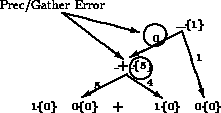
Figure 3: Incorrect parse tree of 1 0 + 1 0.
Of course, using parentheses is always a way of resolving ambiguities. In
fact, it is worth noting that the parentheses operator automatically included
in the extended signature of a module has precedence 0. Therefore, the term
1 (0 + 1) 0 is grammatically correct in BINARY-NAT-PREC.
Maude> red 1 0 + 1 0 .
result Bits: 1 0 0
Maude> red 1 (0 + 1) 0 .
result Bits: 1 1 0
Another subtle problem in the BINARY-NAT module was the different
behaviors of the terms (1 0) + (1 0) * (1 0) and
(1 0) * (1 0) + (1 0). In that module, both operators
_+_ and _*_ had no precedence attribute
explicitly given. As both had the assoc attribute, the gathering
patterns generated by default for both of them was (e E), so the
operators were associated from right to left.
In BINARY-NAT-PREC these two operators have different precedence
values, and the gathering patterns have also been specified:
op _+_ : Bits Bits -> Bits [assoc comm prec 5 gather (E e)] .
op _*_ : Bits Bits -> Bits [assoc comm prec 4 gather (E e)] .
op _^_ : Bits Bits -> Bits [prec 3 gather (e E)] .
The main consequence of this definition is that, as already explained, an
addition cannot be an argument of a multiplication unless it is enclosed in
parentheses. Thus, we have the following reductions.
Maude> red (1 0) + (1 0) * (1 0) .
result Bits: 1 1 0
Maude> red (1 0) * (1 0) + (1 0) .
result Bits: 1 1 0
The following examples illustrate how the precedence and gathering
model of the operators of BINARY-NAT-PREC solves the problems
of precedence and order of evaluation of operators.
- Precedence: Let us consider the term
1 0 + 1 0 * 1 0, in which the two operators _+_
and _*_ are involved.
op _+_ : Bits Bits -> Bits [assoc comm prec 5 gather (E e)] .
op _*_ : Bits Bits -> Bits [assoc comm prec 4 gather (E e)] .
Taking into account the precedences of these operators, the expression
will be evaluated by Maude as an addition of a number and a
multiplication.
Maude> red 1 0 + 1 0 * 1 0 .
result Bits: 1 1 0
Figure 4 shows the correct interpretation of this
term in the signature of BINARY-NAT-PREC, that is,
1 0 + (1 0 * 1 0), while Figure 5 represents
the incorrect interpretation (1 0 + 1 0) * 1 0 and the
precedence/gathering error that avoids such an interpretation.
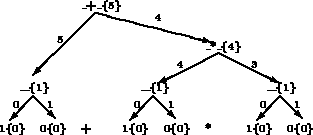
Figure 4: Correct interpretation of 1 0 + 1 0 * 1 0.
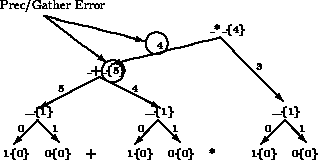
Figure 5: Incorrect interpretation of 1 0 + 1 0 * 1 0.
- Right Associativity: We will illustrate the definition of a right
associative operator by means of the exponentiation operator in the module
BINARY-NAT-PREC. Left associativity is entirely analogous.
op _^_ : Bits Bits -> Bits [prec 3 gather (e E)] .
Without parentheses, which modify the precedence and order of evaluation of
the operators, the term 1 0 1 1 1 0 is evaluated using the right
to left gathering pattern of the operator
__. Figures 6 and 7 draw
graphically the correct and incorrect interpretation of this term.
Maude> red 1 0 ^ 1 1 ^ 1 0 .
result Bits: 1 0 0 0 0 0 0 0 0 0
Maude> red (1 0 ^ 1 1) ^ 1 0 .
result Bits: 1 0 0 0 0 0 0
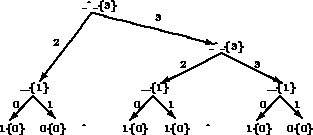
Figure 6: Correct interpretation of 1 0 1 1 1 0.
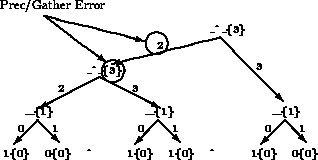
Figure 7: Incorrect interpretation of 1 0 1 1 1 0.











